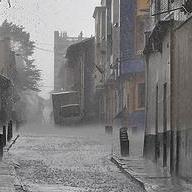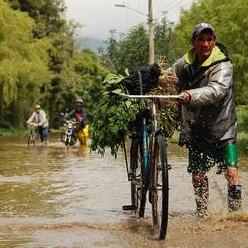 哥倫比亞近日暴豪雨成災,淹沒了全國大部分地區,造成超過160人死亡,140萬人以上受到影響,該國政府已宣佈國家進入災難狀態。此命令適用於哥倫比亞32個省其中的28省,可使該國動用國際資金投入救災工作。
哥倫比亞近日暴豪雨成災,淹沒了全國大部分地區,造成超過160人死亡,140萬人以上受到影響,該國政府已宣佈國家進入災難狀態。此命令適用於哥倫比亞32個省其中的28省,可使該國動用國際資金投入救災工作。
哥倫比亞有2個雨季,分別為4-6月以及10-12月。氣象學家說,由於今年發生反聖嬰現象,冬天雨季加劇。反聖嬰現象是指熱帶東太平洋的低溫氣候型態,典型效果是在南美洲北部產生更多的降雨。
 氣象官員說,由於預期到反聖嬰現象可能持續下去,暴雨可能會持續到1月份。
氣象官員說,由於預期到反聖嬰現象可能持續下去,暴雨可能會持續到1月份。
歐盟和安第斯開發集團已撥款給哥倫比亞,而巴西、智利、法國和委內瑞拉則提供糧食、物資和現金援助。
委內瑞拉也遭受洪水和嚴重雨季,已有3萬5千多人受影響。
委內瑞拉政府撥款1.7億美元,用於重建因降雨損害的6個州共2400間房屋。政府還批准了1500萬美元,完成引導河流及修復受到重創的巴爾加斯州(Vargas)的飲用水系統。委內瑞拉當局已分發超過150噸的食物,並在全國設立87個緊急收容中心。立法委員則正在審理緊急住房法(Emergency Housing Law),以幫助因暴雨而失去家園的人。
此外,2010年大西洋颶風季於30日結束,共造成整個中美洲300多人死於洪水與土石流;也使得此次中美洲雨季成為50年來災情最慘重的一次,災害主要發生在宏都拉斯、瓜地馬拉和薩爾瓦多。颶風使數千人無家可歸,並造成10億美元的損失。
根據聯合國拉丁美洲經濟委員會的報告,在2002年至2008年,該地區因氣候變化所受到的衝擊,估計為150億美元。
根據委員會的說法,如果目前氣候變化的趨勢持續下去,因為颶風和暴雨造成農業、水資源和生物多樣性損失的費用,在2100年可能達到730億美元。這個數字相當於2008年中美洲7國GDP(國內生產毛額)的54%。
The government of Colombia has declared a state of national catastrophe due to the intense rains that have inundated much of the country, causing more than 160 deaths and affecting more than 1.4 million people.
This declaration, which applies to 28 of Colombia's 32 departments, allows the country to access international funds for response efforts.
Colombia experiences two rainy seasons - April through June and October through December. This year, meteorologists say, the winter rainy season has intensified due to the onset of La Nina, a cool weather pattern in the eastern tropical Pacific Ocean, which typically produces more rain across northern South America.
Weather officials say the heavy rains could continue through January as the La Nina is expected to continue.
The European Union and the Finance and Andean Development Cooperation have allocated funds for Colombia, while Brazil, Chile, France and Venezuela have sent food, non-food-items and cash aid.
Venezuela itself is suffering from damaging floods and a severe rainy season that has affected more than 35,000 people.
The Venezuelan government allocated US$170 million for the construction of 2,400 houses in six states affected by rains. The government also approved US$15 million to finish channeling rivers and rehabilitating potable water systems in the state of Vargas, which is one of the worst affected.
Venezuelan authorities have distributed more than 150 tons of food to 87 emergency shelters across the country.
Venezuelan legislators are in the process of approving the Emergency Housing Law, to assist families who have lost their homes due to rains.
The 2010 Atlantic hurricane season ends today, leaving more than 300 people dead across Central America.
The hurricane season is blamed for the worst rainy season in Central America in the last 50 years, with flooding and mudslides leading to 300 deaths, mainly in Honduras, Guatemala and El Salvador. Hurricanes also left thousands of people homeless and caused USD$1 billion in damages.
In addition, the Economic Commission for Latin America reports that the impact of climate change in the region between 2002 and 2008 is estimated at US$15 billion.
According to the commission, if climate change trends continue on their present course, the cost of damages to agriculture, water resources and biodiversity by hurricanes and storms could reach US$73 billion in 2100. This figure is equivalent to 54 percent of the 2008 Gross Domestic Product for the seven countries that make up Central America.
全文及圖片詳見:ENS報導







